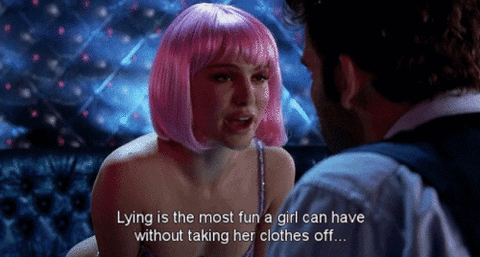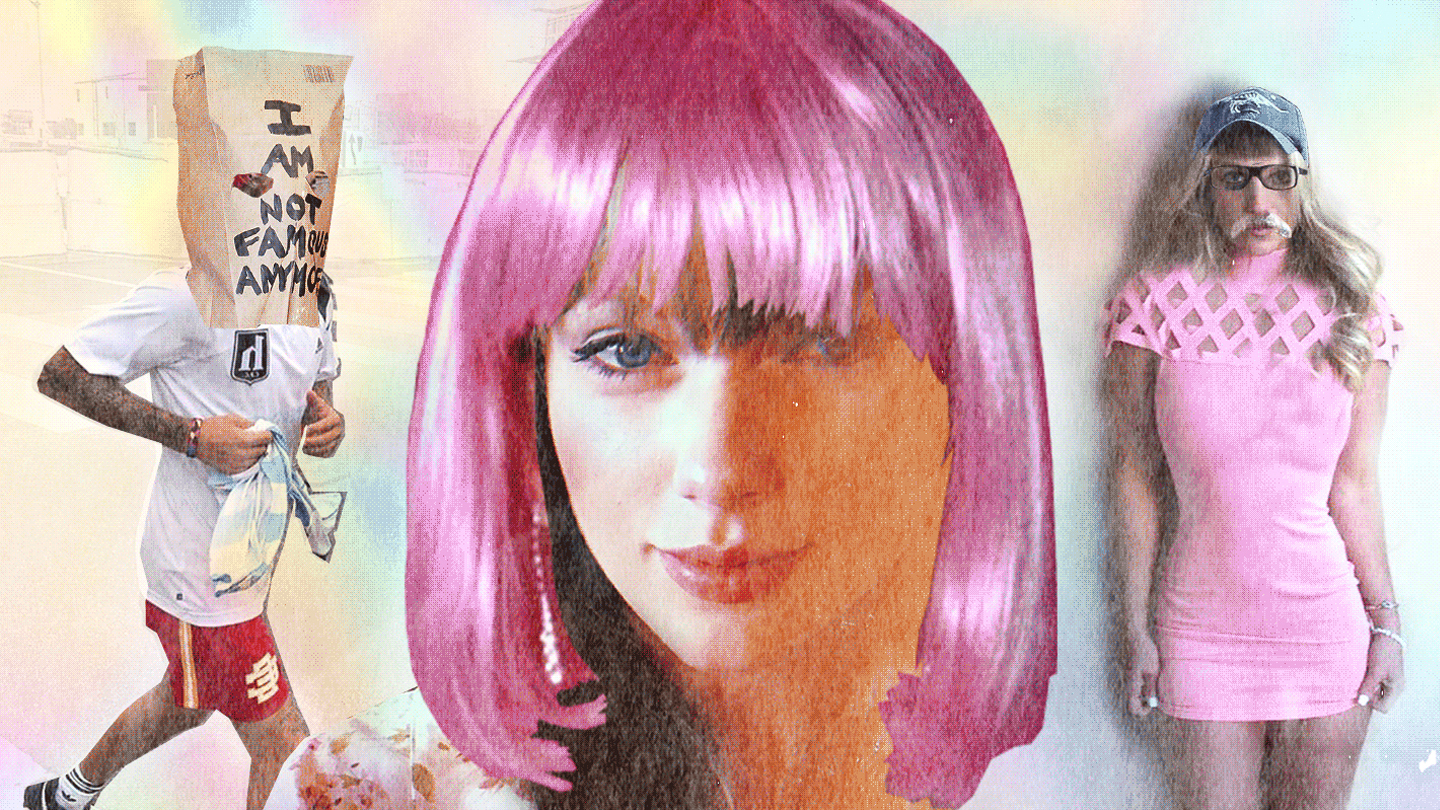Welcome back to TMZ Theory, Philippa Snow’s celebrity studies column. From Taylor Swift’s pink wig to Justin Bieber’s fake moustache, this week she unravels the famous person’s desire to hide, but the inescapable need to still be seen.
For whatever reason, lately I keep seeing the same GIF from the 2004 movie Closer — one that shows Natalie Portman half bare, pink-wigged, and resembling a china doll dressed up to play a showgirl — everywhere. It might be something to do with the candy colours, the shot shaded like a blingee that says “Daddy”. It might be the way one bra-strap, diamond-studded and pale lilac, dips. Probably, it’s the sentiment: “Lying,” the subtitles read wherever there are subtitles included, “is the most fun a girl can have without taking her clothes off…but it’s better if you do.” The character, a stripper named Jane Jones who goes by “Alice” as in “Wonderland”, has just been asked to say “one true thing” by a customer. She does not disappoint.
One of the greatest, rarest pleasures a desirable and recognisable sex symbol could possibly have is privacy — the opportunity to obfuscate, to hide. Natalie Portman, dogged not only by the media’s invasiveness but by the very public shattering of her privacy by certain middle-aged men, can no doubt relate. “I excitedly opened my first fan mail,” she told the crowd assembled at the 2018 Women’s March, her delivery cool and measured and unfuckwithable, “to read a rape fantasy that a man had written me. A countdown was started on my local radio station for my 18th birthday, euphemistically the date that I would be legal to sleep with. Movie reviewers talked about my ‘budding breasts’ in reviews.” Who would not want to lie, or to keep some part of themselves a secret, under circumstances such as these? In the final scene of Closer, Portman’s character is seen on a New York street, turning heads at an astounding rate. In life, as at the Women’s March, she appears to have learned to dim her extraordinary beauty, the way Marilyn Monroe did when she wanted to go undetected.

Hiding your celebrity is in its own way a form of undressing, slipping off what makes you recognisable and shifting into dark mode. If the world knows you as Alice, who would guess you were Jane Jones? When an unfounded rumour briefly circulated in the gossip press this year that Taylor Swift had worn a pink bobbed wig to hide from paparazzi, it was hard not to believe she might have winkingly been referencing that scene from Closer. Ditto when Britney Spears, disguising her shaved head in 2007, took to wearing one as casually as if it were a baseball cap, as if to say: “Lying is the most fun that a girl can have without taking her persona off…but it’s better if you do.” And sometimes, I admit, it’s better — I have never been more intrigued by a shot of Katy Perry than by one of her wearing a Chanel beach-towel like a shroud, or as amused by Justin Bieber as I was when he adopted the most obvious and dumb stick-on moustache and beard to privately shoot hoops. Rita Ora, normally a pin-up, is more interesting in costume as a Soundcloud rapper’s ghost.
“As tempting as it is to un-ring the bell of perpetual recognisability, there is still a desire to be seen that outlasts any wish to fully disappear.”
When famous people do decide to hide, there is an interesting loopiness in seeing them attempt to return to their old, un-famous lives, the effect not unlike watching an amateur magician trying to return a conspicuous rabbit to a tattered hat. What occasionally results are images worthy of dissertations, as with this extraordinary photograph of the extremely troubled actress and former Nickelodeon star Amanda Bynes being arrested in a wig that recalls nothing so much as a famous work by Cindy Sherman — “[she] presents herself in ways no actual model ever could,” the critic Martin Gayford writes about the Sherman image, unwittingly offering a fair description of mid-breakdown Bynes, “desperate, wild-eyed, apparently suffering from a severe hangover, with matted hair” — or a 2016 sequence in which Kim Kardashian, holidaying with Joe Francis on his Mexico estate, deployed a body double. (The fact Kim and decoy Kim had entirely different faces hardly mattered, given the attention guaranteed to be paid to the doppelganger’s body. John Updike wrote that celebrity was a mask that could eat into the face, but did not specify exactly what it might do to the ass.) Leonardo DiCaprio, who is mostly allowed to have a private life because he is a middle-aged man who has chosen to look like a middle-aged man, has adopted an approach that comes across on camera like an Erwin Wurm performance: he buries his face in puffas, or adopts a pitch-black mask that looks like something out of Amadeus, or wears an umbrella like it’s an insane, shoulder-length cape.
The greatest irony is in the way that only one thing works when dodging paparazzi, which is to eschew elaborate disguises in favour of actually acting just like us: re-wearing outfits, boringly and un-sexily, until any candid images decrease in value. Kristen Stewart, who once also tried a pink wig as a means of hiding her queer and moody light under an uncharacteristically femme bushel, has suggested that her love of gymwear and fuccboi-ish tees is as much to do with passing undetected as it does with a genuine love of tomboy style. “The reason you see me wearing simple clothes is because I don’t want to give [the paparazzi] anything,” she shrugged in 2012. “Literally, I go outside every day in the same thing, so they can’t say anything.” It takes an unusual famous person to want to be totally anonymous, which may be why appearing average is a less popular disguise than a paper bag, or a mask of a tiger, or a suit made to resemble pepperoni, or a sheet of paper with an urgent moral message scrawled on it in ink. As tempting as it is to un-ring the bell of perpetual recognisability, there is still a desire to be seen that outlasts any wish to fully disappear.
Natalie Portman’s real name, anyway, is actually Natalie Hershlag, and if you believe you’ve seen all there is to be seen of her famous body, you’re mistaken. I remember that once, hiding from the paparazzi, she wore a pink hat pulled down in such a way that it looked at first glance as though she might be in that famous wig, but backwards, which was in all likelihood an accident, but still made for an indelible image. “I think,” she told CBC last year, “I can still walk down the street without being noticed.”
What makes the line in Closer about the deliciousness of lying infinitely more interesting is the fact that right before it, the man trying to convince Jane to have sex with him unleashes a tirade. “All the girls in this hellhole,” he roars furiously, trying to convince her that she owes him by dint of her sexiness, “the pneumatic robots, the coked-up baby dolls, and you’re no different. You all use stage names to con yourselves into someone else, so you don’t feel the shame when you show your cunts and assholes to complete fucking strangers… You think you haven’t given anything of yourselves.” It sounded to me like a screed from Reddit that might have been written about almost any famous woman. In their shoes, I’m certain I would choose to hide, too.
